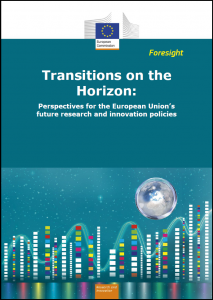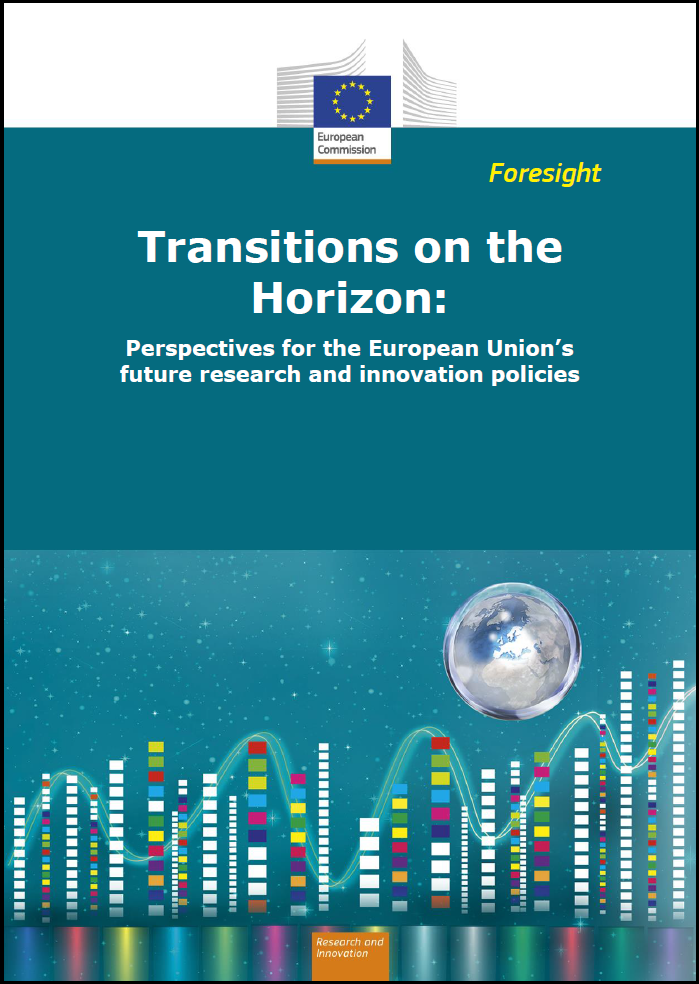Transitions on the Horizon: Perspectives for the European Union’s future research and innovation policies. Final report from project BOHEMIA Beyond the horizon: Foresight in support of the EU’s future research and innovation policy. Matthias Weber, Liviu Andreescu, Kerstin Cuhls, Bianca Dragomir, Radu Gheorghiu, Susanne Giesecke, Andrea Ricci, Aaron Rosa, Petra Schaper-Rinkel and Carlo Sessa, Brussels 2018

Key messages from the BOHEMIA foresight study:
EU R&I policies need to be transformative.
The challenges of the future require not only higher R&D investments, but also systemic transitions that will ensure a strong Europe in a sustainable world. A Europe that is able to protect, empower and defend, but also able to lead the world towards sustainability. EU R&I should become the engine of European and global transitions.
Anticipation and preparedness needs to be at the heart of EU R&I policy. EU R&I should not only generate innovations that do not exist in market. It should anticipate and prepare for changes in science, technology and innovation, in society, the economy and politics.
Likely, aspirational and disruptive future scenarios should be considered in the definition of R&I policy priorities. Evidence from analyses and from public engagement and deliberation should play a key role in the programming of EU R&I investments.
Policy experimentation is necessary in order to stimulate transitions. It is important to develop the space for policy experiments and social innovation in the junction of EU R&I and other policies of the Union.
In the future both threats and wishes may materialise. Europe should consider preparing for a wold in which:
- Assistive services and technologies such as robotic assistants, virtual trainers and small exoskeletons, are a huge economic sector.
- The expanding bioeconomy brings growth and environmental benefits.
- Energy is cheap and environmentally benign. Electricity for transport, housing and industry comes from a smart grid of novel and renewable sources
- Cybersecurity hacks proliferate. Governments build responses based on both social participation and cutting-edge technologies.
- Expert systems fed with just in time data are used routinely for the prediction and management of all kind of situations and activities.
- Medical science and public health advice have all but defeated communicable diseases.
- Emotional transparency prevails as the internet makes analysis of emotional markers more accurate and accessible to all.
- Life expectancy continues to increase as more and more human organs and tissues can be replaced without complications.
- Data analytics and robotics combine with societal participation in security to anticipate and mitigate threats.
- The EU has become a carbon neutral zone, slashing the release of greenhouse gases and expanding carbon sinks in its territory.
- Sustainable and circular consumption and production patterns make Europe more self-sufficient and competitive in its industries.
- Mature 3D printing technologies have become one of the main modes of production of finished goods.
- A new economic paradigm respects planetary boundaries and values biodiversity and natural ecosystems.
- Precision medicine anticipates and cures illnesses.
- With basic income guarantees, people work for the sense of purpose that it brings.
- Widely accessible seamless intermodal mobility services slash car ownership across the EU.
- Wide spread micro-sensors generate massive data, enabling good governance but also used for malicious purposes.
- Food is more diverse, sustainable, secure, efficient and healthy, coming from traditional agriculture as well as from novel types of supply.
- People benefit from open science, open innovation, and open education but institutions are challenged to adapt.
These likely future scenarios should be factored in EU R&I policy, which is determinant for Europe’s ability to shape the future and to benefit from it.
Read the full report at: https://ec.europa.eu/info/research-and-innovation/strategy/support-policy-making/support-eu-research-and-innovation-policy-making/foresight/activities/current/bohemia_en
